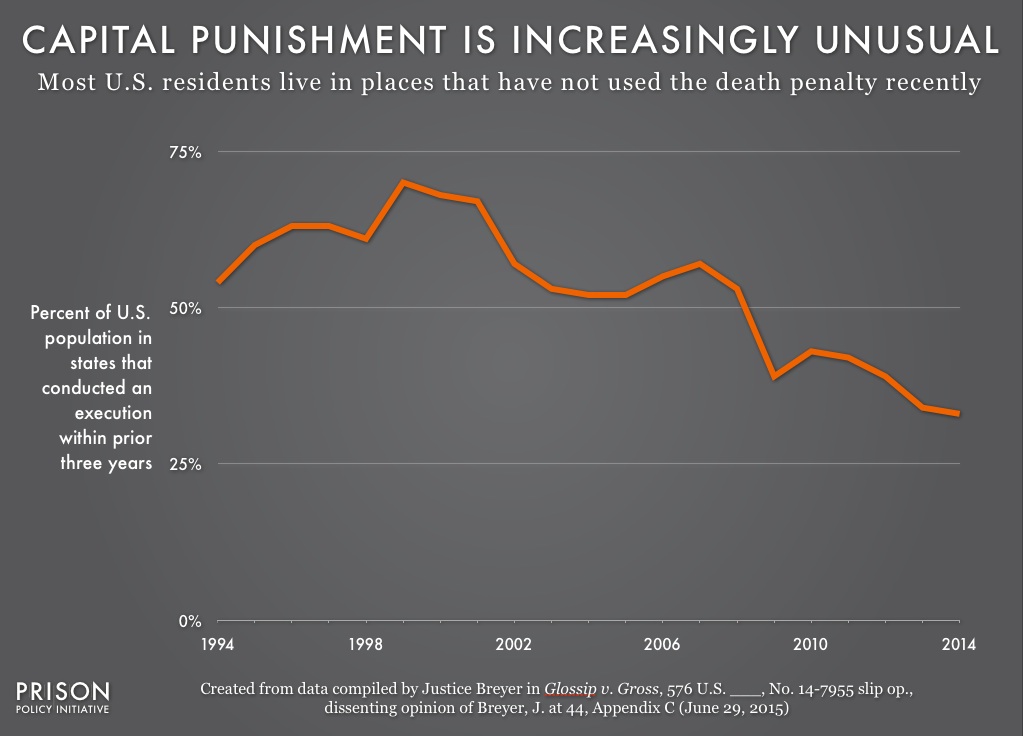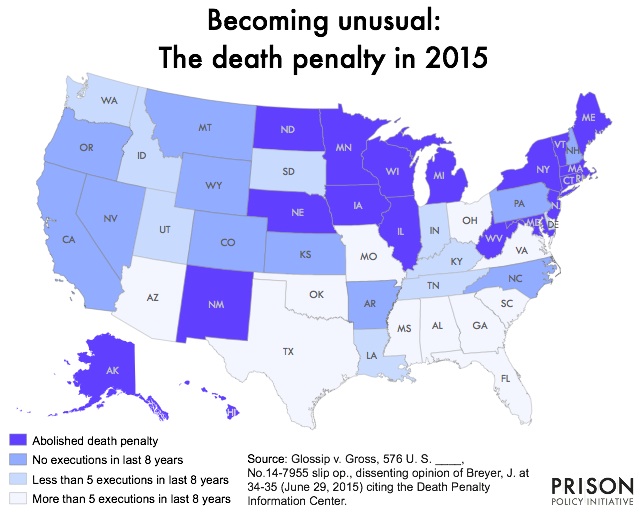Justice Breyer argues the death penalty isn’t just cruel, it’s unusual too
83% of the U.S. population lives in places where the death penalty is unusual either by law or by practice.
by Rachel Gandy, July 2, 2015
On Monday, the U.S. Supreme Court narrowly upheld the constitutionality of a drug used to carry out executions, but one of the dissenting judges raised a more fundamental question: Is the death penalty itself constitutional? In his dissent to the Glossip v. Gross decision, Justice Stephen Breyer fiercely argued that, by today’s societal standards, capital punishment is both cruel and unusual.
To prove the cruelty of capital punishment, Justice Breyer reviewed three key points. First, death sentences lack reliability because they are frequently (and erroneously) given to two types of people: those who are innocent and those whose convictions must be thrown out due to constitutional errors in their trials. Shockingly, courts and state governors are 130 times more likely to exonerate a defendant when a death sentence is imposed than when one is not. Second, capital punishments are arbitrary. Judge Breyer summarized the evidence showing that race, gender, and geography are often more influential than the severity of a crime in determining if people will be sentenced to death. Third, the long delays necessitated by due process both harm defendants and undermine any deterrent or retributive effects of the death sentence.
To me, the most intriguing part of Justice Breyer’s dissent was his argument that capital punishment is unusual. He presented data to show that the death penalty has fallen out of favor nationwide. For example, the number of death sentences imposed and the number executions conducted have sharply declined in the last 15 years. (See Appendices A and B in the dissent for the graphs that correspond with these facts). Justice Breyer then makes a powerful point about how rare the death penalty has become by calculating the percent of U.S. residents who live in states that have recently conducted an execution. His findings are striking, so we used the data he provided to illustrate his argument with this graph:
 The death penalty is on its way out. The portion of the country that lives in a state where the death penalty was recently used has been in consistent decline for 15 years. In 1999, 70% of the U.S. population lived in a state that used the death penalty within the last three years, but by 2014, only 33% of the U.S. population lived in such a state.
The death penalty is on its way out. The portion of the country that lives in a state where the death penalty was recently used has been in consistent decline for 15 years. In 1999, 70% of the U.S. population lived in a state that used the death penalty within the last three years, but by 2014, only 33% of the U.S. population lived in such a state.
To be sure, public opinion polls show consistent theoretical support for the death penalty, but the reality is that capital punishment is rarely used. Today, 19 states (and the District of Columbia) have formally abolished the death penalty, but the map below shows that a death sentence can hardly be considered “usual” punishment in the remaining 31 states:
In the 31 states that do not legally forbid the death penalty, more than a third have not actually conducted an execution since 2007. (Therefore, in total, 30 states have eliminated the death penalty either through legislative action or by common practice.) Another nine states have conducted fewer than five executions since 2007. That leaves only 11 states where the death penalty cannot be deemed “unusual.”
Even in the 11 states where the death penalty isn’t “unusual,” three states conduct an overwhelming majority of the total executions. In 2014, 80% of all U.S. executions took place in Texas, Missouri, and Florida, where less than 17% of the U.S. population lived. That leaves 83% of the U.S. population living in places where the death penalty is unusual either by law or by practice.
The Supreme Court’s decision shines a spotlight on a decades-old debate that tends to focus primarily on the cruelty of capital punishment. Justice Breyer, however, used his dissent to shift the conversation. He unequivocally showed that the Eighth Amendment’s other requirement is being violated—the death penalty is increasingly unusual, and it’s time to rethink its constitutionality.
Correction: The map originally published with this post incorrectly switched the colors for Vermont and Utah. This was corrected at noon on July 3, 2015.





I have always been against the death penalty even if no other in my family was. I questioned it when I was 9 years old and am now 80. I have never understood it. Now, my comment to all is we have two kind of death penalty, the execution style and then the DBI (Death by incarceration which I truly believe is worse. People who are sentenced to life with out parole may live in cages for 40 or more years before they die. Suely there is a better way. We have many who in cages who are no longer able to walk, talk or feed them selves yet they have loved ones at home who would take care of them. I remind all of you that it is not only the convict who pays but also the family members who are suffering right along with the one convict.
So if our criminals are incarcerated “For Life,” could society live with:
Jail until the age of 80.
Then if they have a “sponsor” they can live out the rest of their days with them.
Stipulations – Ankle bracelet, 20′ Diameter roaming limit, no vehicles, food limits, etc.
Would this help our jailing costs a little & free up a space?
I can’t see victims of the crime being much more gracious than this. A punishment is a punishment even if we do pay for it as a society.
The death penalty doesn’t sit right with me as a human, let alone in the democratic process. I wish we would evolve to see the bigger picture but I don’t think we’ll ever get there.
No politician wants to make the Big moves – the Big moves are Grace and standing for Human rights.
~RC
[…] project that centers the experiences of African Americans and murder victims’ families within the death penalty repeal movement; two groups disproportionately affected yet grossly underrepresented within this […]
Executing a human being to show that murder is wrong… well, it’s just wrong. I understand (some) families want vengeance, pay back, an eye for an eye… but let’s be real here. State sponsored executions are nothing less than murder, aren’t they?
When we (as a society) take away all the politics and bells & whistles, we have literally killed another human being, right? We nodded our barbered heads and gave permission for the state to carry out a murder. That is the bare bones of it. We are murderers. We lay people down on gurneys, slip needles into the condemned arm, and let the “juice” run into the vein.
That’s murder. You may call it legal, but it’s killing.
this is outrageous
Save Timothy Wayne Fletcher. He didn’t deserve the death penalty. For same crimes (commited on drugs and in affects and not even planed at all) in Europe ppl receive max 20yr sentence. Please lets save Timothy Wayne Fletcher FL
No death penalty!!!
Pleeeease people consider every fact, buy didn’t deserve the l lethal injection.
SAVE TIMOTHY WAYNE FLETCHER
Love you baby ❤ you’ll always be my one and only, always in my heart
SAVE TIMOTHY WAYNE FLETCHER
I feel your pain baby, I don’t know what to do and how to help you. Oh someone just please consider LWP He didn’t deserve to die. He’s a wonderful and caring boyfriend that loves animals, he didn’t mean that, he didn’t plan it, he panicked and now he deserves to die? You are not God let the Lord judge him… Baby I love you soooo much for ever and ever til the end of time.